Hover your mouse over the image and see the AI genereated caption and rating. Have fun!

AI Summary: The Roman Baths in Bath, Somerset, are a testament to Roman engineering and architecture. The natural hot springs supply warm water to the baths, which feature an impressive Great Bath with ancient columns and statues. Visitors can explore the temple courtyard, see artifacts like the gilt bronze head of Sulis Minerva, and discover over 130 curse tablets inscribed with messages from wronged bathers.


Bath Abbey: Stone, Sky, and Sunbathers
Rating: 9/10
Here stands Bath Abbey, an undeniably impressive stone edifice dominating the frame under a cheerful blue sky scattered with fluffy white clouds. The magnificent Gothic architecture, complete with soaring buttresses, intricate window tracery, and a prominent tower topped with a flag, truly makes this a showstopper of a subject. Below, a lively scene unfolds with various people meandering, sitting on benches, or simply admiring the view, adding a human scale and a touch of everyday life against the monumental backdrop. The mood is one of pleasant historical grandeur mixed with relaxed public square activity on what appears to be a lovely, sunny day – perfect for soaking in centuries of history or just grabbing a bench.
From a photographic perspective, this image nails the primary subject with a good angle that captures the height and breadth of the Abbey's facade. The composition is solid, placing the building front and center while including the foreground activity to provide context and depth. Lighting is bright and directional, highlighting the texture of the stone and creating pleasing shadows that emphasize the architectural details, though perhaps a touch harsh in places as is typical with midday sun. The colors are vibrant – the warm, honey-colored stone pops against the deep blue sky. While the busy foreground with people is part of the scene's reality, a purist might crop them out for a purely architectural shot, but their inclusion here gives a sense of place and time, reminding us that these historical buildings are still living parts of the city. It's a strong, classic capture of a beautiful building on a beautiful day, certainly worthy of the camera's attention.


The Barefoot Balladeer
Subject: 7/10
This image captures a classic street performance scene, featuring a busker immersed in playing his acoustic guitar under bright sunlight outside a historic building. The musician, identifiable by his wavy blonde hair, headband, and relaxed attire, is perched on a somewhat precarious-looking white stool, giving off a vibe of casual dedication. His guitar case, laid open on the ground, acts as his makeshift shopfront and collection plate, prominently displaying a sign for his "New Album" with prices (£10 for one CD, a bargain 2 for £15), a QR code for easy digital contributions or perhaps downloads, and a scattering of currency, hopefully more than just small change. Surrounding him is the paraphernalia of the modern busker: a small silver box (perhaps a pre-amp or effects pedal), cables, and a rather industrial-looking black dolly folded nearby, suggesting this setup requires significant hauling. The mood is one of vibrant public life and artistic endeavor, set against a backdrop of passersby and grand architecture, a common tableau in bustling city centers.
From a photographic perspective, the bright, direct sunlight creates strong highlights and shadows, a challenge for exposure but also adding dramatic contrast. The subject is well-lit, though some parts of the scene, particularly the stone building in the background, appear a little washed out in the brightest areas. The composition places the musician slightly off-center, guided by the rule of thirds, with the opened guitar case occupying the foreground, effectively grounding the scene and providing crucial context about the busker's purpose. The shallow depth of field nicely blurs the background, separating the performer from the distant crowd and ornate architecture, minimizing distractions. The inclusion of details like the album sign and QR code is a clever way to tell the story of how buskers operate today – merging traditional performance with modern tech. The presence of the empty dolly and cables adds a touch of documentary realism, hinting at the logistical effort behind the seemingly spontaneous performance. It's a solid capture of a moment, even if the lighting is a touch harsh and the foreground a little cluttered.
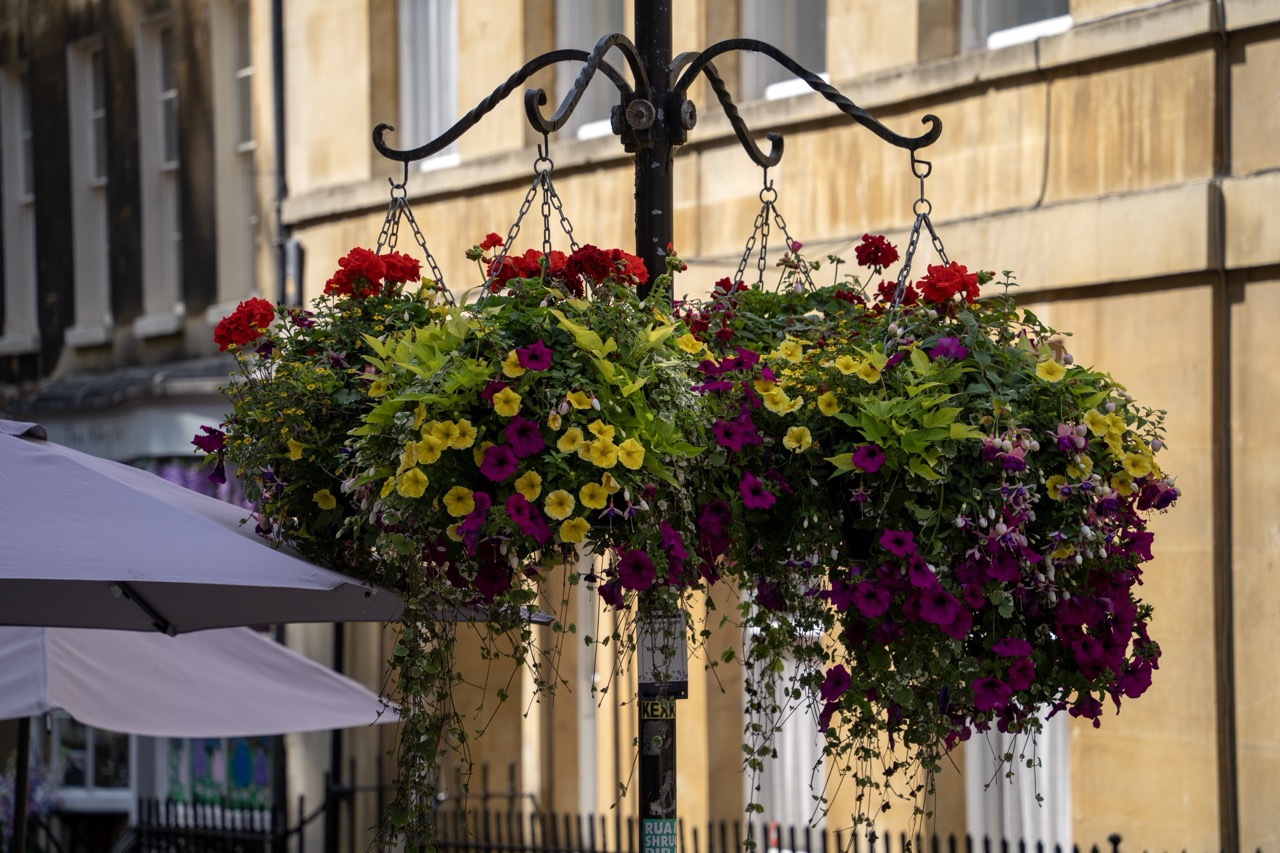

Hanging Basket Extravaganza
Rating: 7/10
Well, isn't this just a classic bit of summertime street décor? We've got some seriously lush hanging baskets overflowing with a riot of colour – bright red geraniums, sunny yellow petunias, and deep purple cascades that look like they're trying to escape their leafy confines. They're dangling from a sturdy lamppost that appears to be doing double duty as a floral chandelier holder. The mood is definitely cheerful and vibrant, the kind of scene that screams "tourist town with civic pride," probably requiring a dedicated watering schedule worthy of a small army. There's an umbrella partially obstructing the left side, adding a touch of café culture or perhaps just providing shade for someone enjoying the view (or trying to avoid getting dripped on by ambitious vines).
From a photography perspective, the composition is a bit of a challenge. The lamppost is dead center, which can feel a bit static, and the busy background of a traditional stone building with multiple windows doesn't entirely disappear, even with some bokeh. The lighting seems a tad harsh in places, creating strong shadows within the baskets, although it does make the reds and yellows pop. The subject matter itself, while pretty, is a bit generic – how many photos of hanging baskets does the world *really* need? Still, the sheer abundance and variety of the flowers are commendable, offering a lovely splash of organic chaos against the structured lines of the architecture and the slightly awkward presence of the lamppost. It's a nice record of a pleasant urban detail, even if it won't win any avant-garde awards.
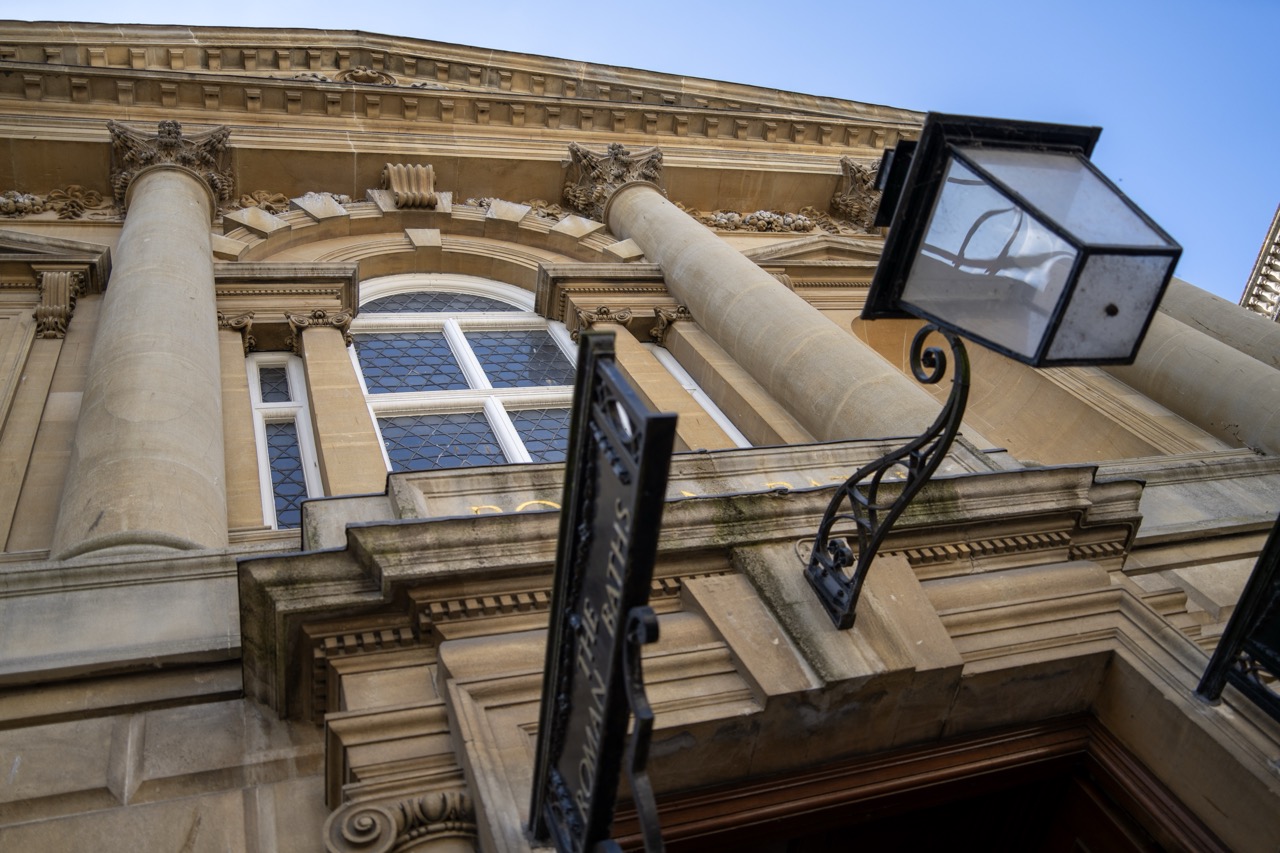

Upward Gaze at Grandeur and a Wobbly Lamp
Subject Rating: 8/10
This image captures a fascinating, low-angle perspective of a majestic historical building, dominated by impressive classical architecture. The subject, the intricately detailed stone facade with its towering columns and arched windows, is undeniably grand, earning a solid 8/10 for its inherent beauty and historical significance. The scene gives the impression of being right at the foot of this imposing structure, looking steeply upwards. The mood is one of awe and reverence for the craftsmanship and scale of the building, juxtaposed with a touch of visual quirkiness thanks to the chosen viewpoint. Prominently featured in the foreground is a dark, ornate lamp post with a glass lantern, hanging slightly askew and adding a gritty, street-level detail that contrasts with the polished stone. Below the lamp, a black sign is visible, providing context to the location – "THE ROMAN BATHS," hinting at a place steeped in history.
From a photographic standpoint, the composition makes a bold choice with the dramatic low angle, which effectively emphasizes the building's height but introduces significant perspective distortion, leading to a noticeable tilt that might make purists twitch but gives the image energy. The large column on the left acts as a powerful anchor, while the overhead lamp on the right creates an interesting diagonal line that pulls the eye towards the upper corner. The lighting is relatively soft, highlighting the intricate details of the Corinthian capitals and decorative frieze without harsh shadows, allowing the warm, golden tones of the stone to truly stand out against the bright blue sky background. While the angle certainly presents a challenge in keeping lines straight, it successfully conveys the scale and grandeur of the building, placing the viewer directly beneath its historical weight, albeit with a lamp post leaning into the frame like an eager tourist.
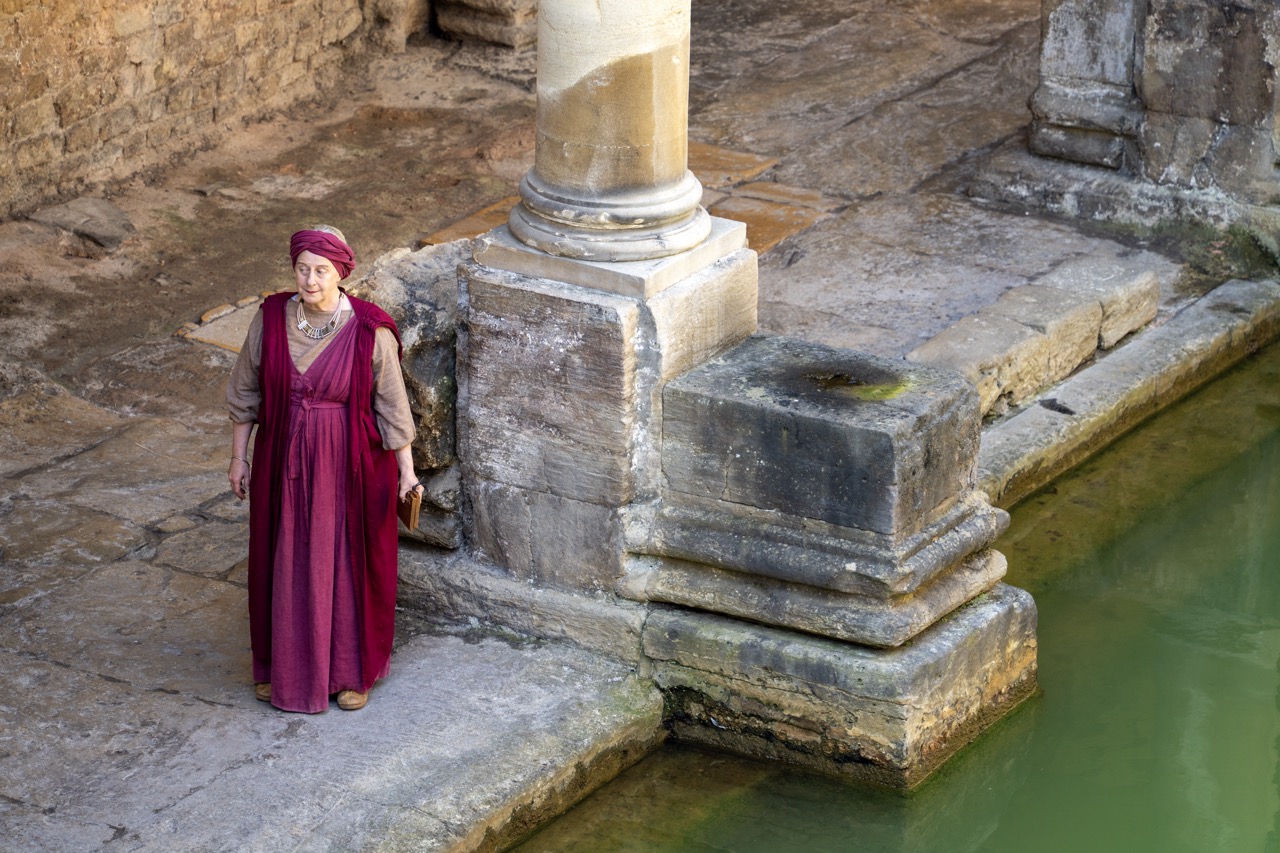

Guardian of the Ancient Waters
Subject Rating: 7/10
This image captures a striking figure, an older woman dressed in historical garb resembling a Roman tunic and palla, complete with a turban and substantial necklace, standing beside the famous green waters of the Roman Baths. She appears paused, holding a small book or object, looking slightly off-camera with a thoughtful or perhaps slightly weary expression, giving the scene a touch of posed formality or possibly capturing a historical reenactor mid-explanation. The background is dominated by the ancient stone architecture of the baths – rough-hewn blocks, a massive column base, and the stone edging of the pool itself, creating a powerful sense of history and place. The vibrant, almost otherworldly green of the thermal pool provides a strong visual counterpoint to the muted earth tones of the stone and her costume.
From a photographic perspective, the composition utilizes the weight of the imposing column base on the right to balance the human subject placed effectively on the left, creating a sense of scale between the ancient structure and the person within it. The natural lighting, likely diffused indoors, highlights the rugged textures of the stone beautifully and allows the rich color of her costume to stand out without being overpowering. While the pose feels a bit static, it effectively grounds the subject within the historical context. The bold color contrast between the deep red/maroon of her clothing and the intense green of the water is perhaps the most arresting element, proving that sometimes the most striking color palettes are found in unexpected historical sites (and maybe involve a bit of beneficial algae). It's a well-executed shot that leverages the unique setting and costume for visual impact, perfectly capturing the slightly theatrical, deeply historical vibe of the location.
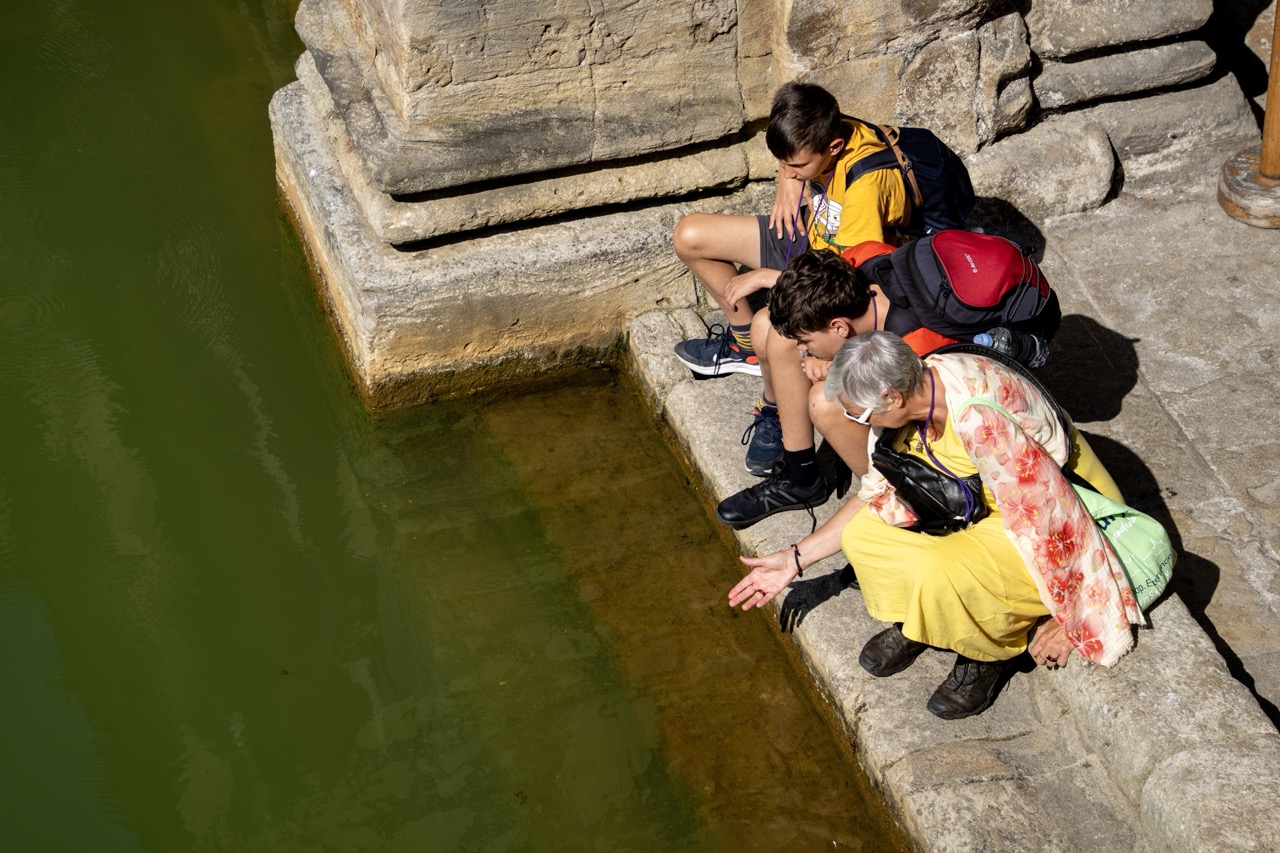

Contemplating the Murky Depths
Rating: 7/10
Gathered by the edge of what appears to be a rather verdant body of water, three figures are lost in contemplation, perhaps pondering the philosophical implications of algae growth or simply waiting for something interesting to swim by. The scene is set against a backdrop of ancient-looking stone, suggesting a historical location where people have likely been staring into the water for centuries, making this a timeless moment of low-key curiosity. The composition uses the diagonal line of the stone edge to draw the eye from the foreground water up towards the figures, creating a sense of perspective and leading the viewer into their quiet observation. The subjects, an older woman in a bright yellow dress and floral scarf reaching tentatively towards the water, and two younger males huddled behind her, their backpacks casually slung, add a human element to the otherwise stark stone and water setting. There's a palpable sense of calm and shared focus in this candid snapshot.
From a technical standpoint, the photographer captured a genuine moment, but the lighting is certainly having a moment of its own. The mid-day sun, strong and unforgiving, casts harsh shadows, particularly highlighting the texture of the stone and creating dramatic, almost theatrical, shadows around the figures. While it emphasizes the heat of the day, it's not the most flattering light for portraits – you can practically hear the subjects squinting. The color palette is anchored by the striking, almost unnatural green of the water, contrasting nicely with the warm greys and yellows of the stone and clothing. The inclusion of details like the woman's white-rimmed glasses, the bright red backpack, and the delicate floral pattern on her scarf add visual interest and hint at individual personalities. While the light could be softer, the image successfully captures a simple, relatable moment of human interaction and observation in a unique environment.
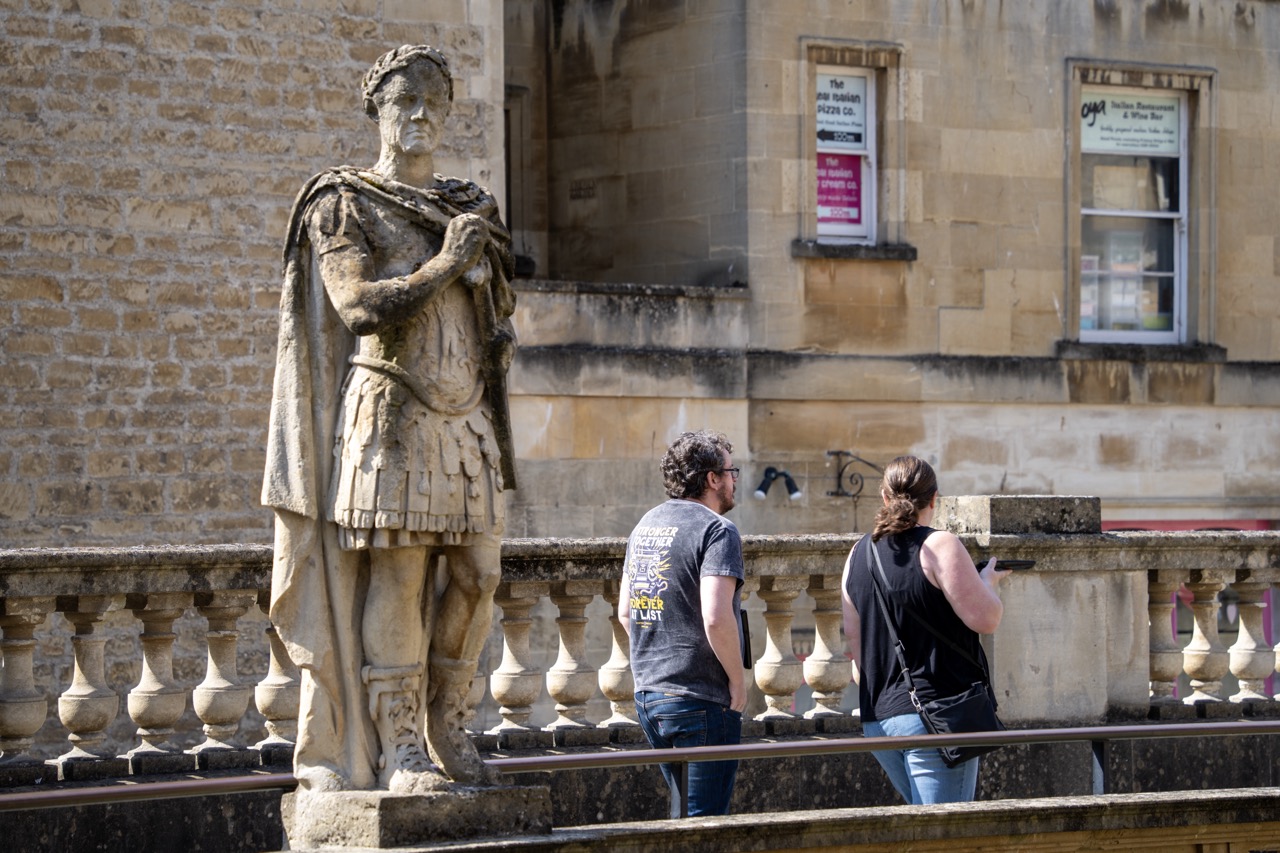

Silent Sentinel Meets Modern Mundanity
Rating: 7/10 (for the stoic stone subject)
Here stands a venerable stone statue, sporting a dashing toga draped over battle-ready armor, a true relic rated a solid 7/10 for its weathered charm and historical gravitas. He's likely a Roman figure, perhaps contemplating the fleeting nature of empire or just wondering where he left his chariot keys. Behind him, blissfully unaware of his centuries of silent observation, stroll two contemporary humans. One is engrossed in something off-camera (maybe the menu for one of those Italian places?), while the other seems deep in conversation, adding a layer of modern, everyday life to the ancient scene. It’s a classic tourist site tableau, where history stands still and the present just keeps walking by.
The composition is effective, placing the imposing statue off-center to command attention, while the railing acts as a leading line guiding the eye back towards the human element and the building beyond. The lighting is a bit harsh thanks to direct sun, creating deep shadows that emphasize the texture of the stone and the statue's stern expression, though it also flattens the scene slightly. The color palette is predominantly warm stone and bright sunlight, punctuated by the darker clothing of the people. The background, with its historic-looking building and the somewhat anachronistic signs for "The Real Italian Pizza Co." and "OYA Italian Restaurant & Wine Bar," humorously underscores the blend of past and present. The mood is one of poignant contrast – the enduring monument to history versus the transient, almost oblivious presence of modern life, captured in a candid, observational style that highlights the ironic juxtaposition.
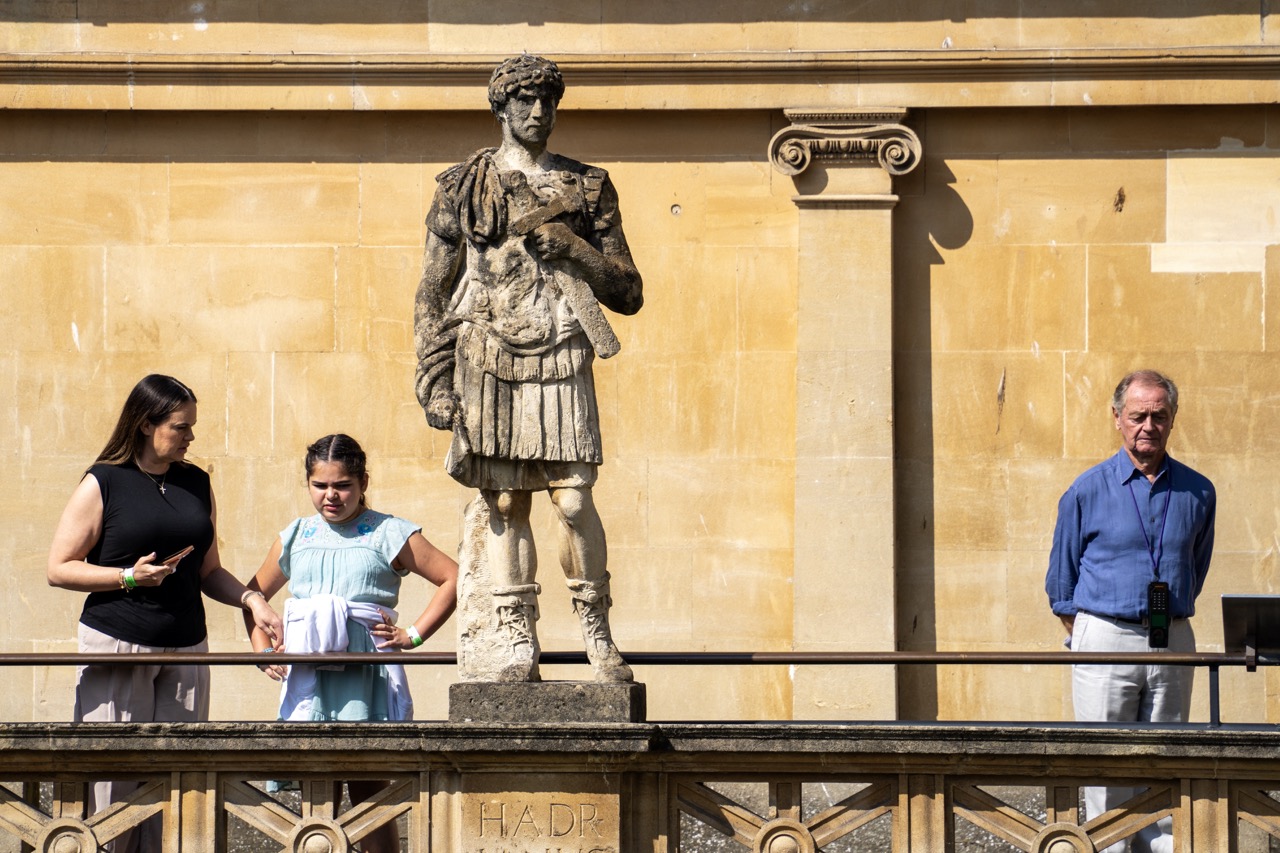

Standing Stone and Strolling Spectators
Subject Matter: 8/10
This image presents a compelling tableau where the distant past meets the immediate present. Our central figure, a weathered stone statue of a Roman emperor, likely Hadrian given the partial inscription visible on the railing, dominates the frame with a silent, enduring presence, earning it a solid 8/10 for historical weight and visual impact. Around this timeless relic, modern life continues. On the left, a woman is engaged with her phone, perhaps navigating or sharing her historical discovery, while a young girl beside her seems a bit restless, hands on hips, a picture of modern impatience against the backdrop of centuries. To the right, an older gentleman stands in quiet contemplation or perhaps just taking a break, hands formally clasped behind his back, a lanyard dangling around his neck, equipped with some electronic device that feels a million miles away from the statue's era. The scene feels observational and subtly humorous in its juxtaposition – the gravity of history offset by the everyday concerns of the visitors.
From a photography standpoint, the composition effectively places the statue as the central pivot, with the human subjects acting as supporting elements that provide scale and context. The horizontal railing in the foreground serves as a strong leading line and creates a sense of depth, suggesting the viewer is overlooking the scene. The background, a large, unadorned stone wall with classic architectural details like the Corinthian capital and molding, provides a clean, historical setting. The lighting is strong, direct sunlight, typical of mid-day, which creates dramatic shadows, especially from the capital, and emphasizes the texture of the stone but also leads to high contrast on the subjects. The color palette is dominated by the warm yellows and browns of the stone, providing a consistent base that makes the blues and blacks of the people's clothing pop. While the light is a bit harsh, it does lend a certain crispness to the image, capturing a fleeting moment where time seems to fold upon itself.
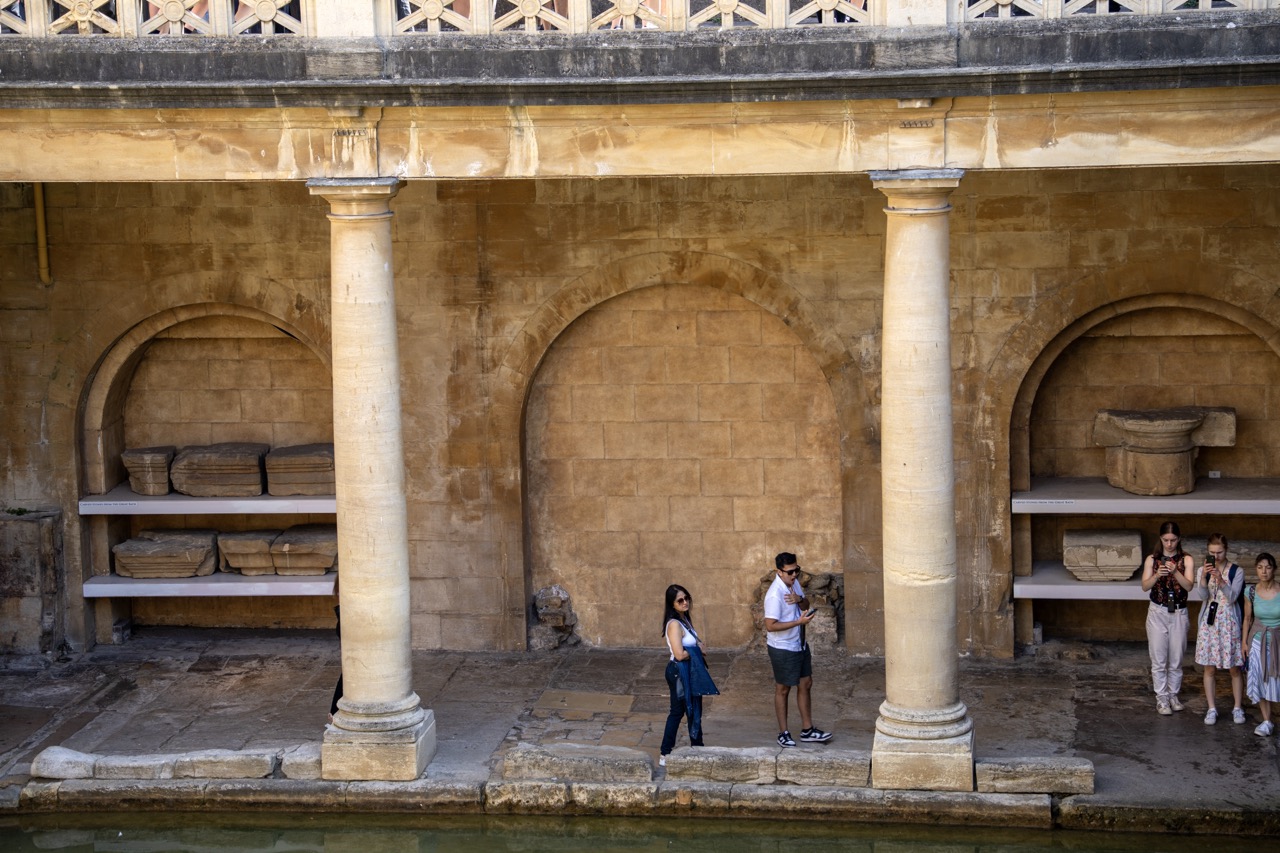

Ancient Stones, Modern Stares
Subject Rating: 7/10
Welcome to the ancient world, complete with helpful modern humans providing scale and proving that stone lasts longer than most phone contracts. We're at what appears to be the Roman Baths, where history is literally set in stone (and displayed on shelves), and people flock to admire the craftsmanship of folks who didn't even have Instagram. The main subject here is the enduring architecture, framed by imposing columns, but the real drama is the universal tourist pose: phone in hand, looking slightly bored or utterly engrossed, depending on the quality of the audio guide. We see a few individuals scattered about, adding life (and photographic challenges) to the scene, standing by the edge of the green water that hints at the bath itself, ready to soak up some history (or at least get a good selfie).
From a photography perspective, this shot uses the classic trick of framing with the massive columns, drawing your eye into the arched recesses displaying ancient bits of rock – presumably very important bits like someone's preferred bathing stool. The composition is solid, if a little static, capturing the depth of the structure along the back wall. The lighting, however, is a classic historical site conundrum: bright, direct sun creating harsh shadows that obscure detail and give everyone unfortunate contrast – proof that even ancient wonders suffer from midday sun. While it does bring out the beautiful texture of the stone, it makes capturing balanced exposure a nightmare. The color palette is predictably earthy and muted, fitting the ancient theme, but the greens of the water provide a small splash of contrast. It's a good record of the location, capturing the juxtaposition of ancient grandeur and the modern tourist pilgrimage, but navigating crowds and difficult light to make it truly sing is the eternal battle for the travel photographer.
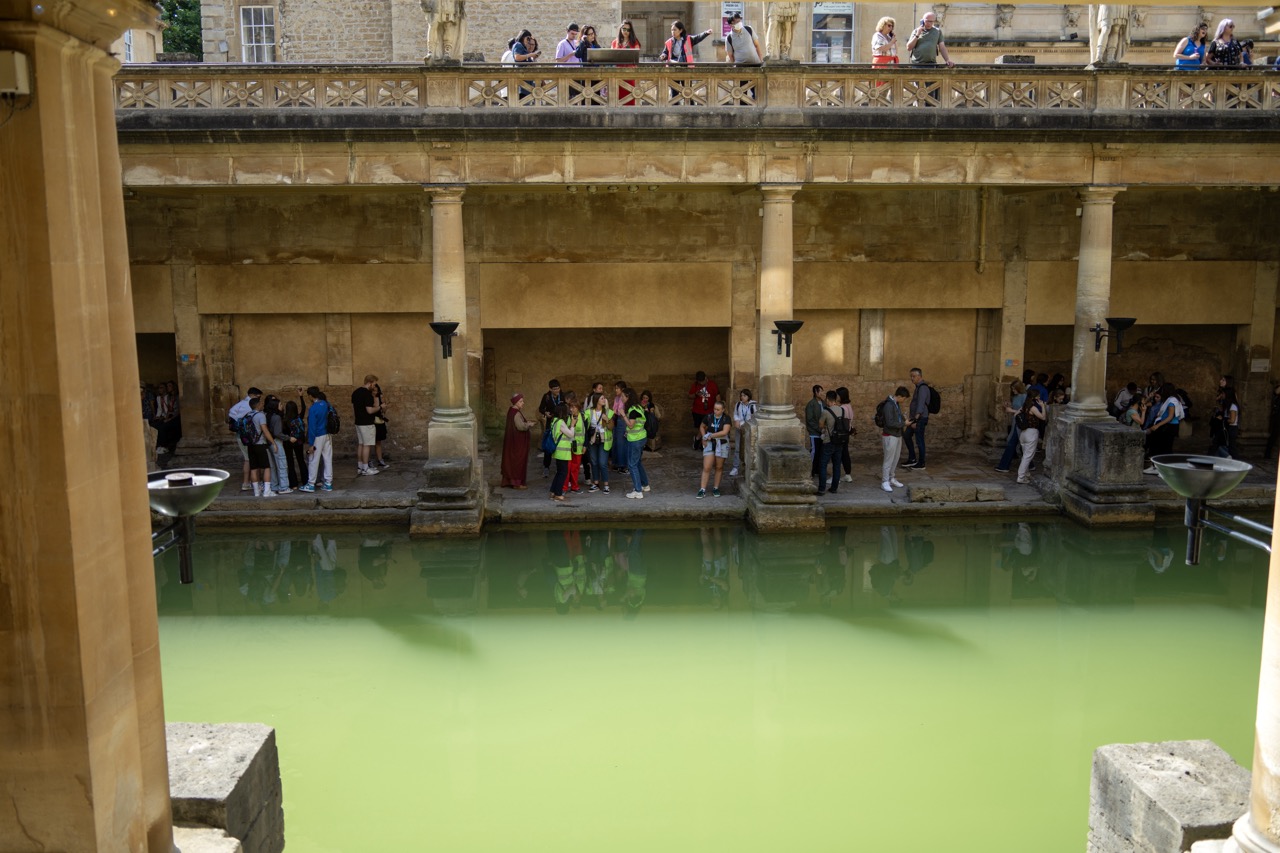

A Dip in Time (or Maybe Just Algae)
7/10
Step right up and gaze upon the illustrious Roman Baths, where history meets a shade of green typically reserved for radioactive waste or particularly aggressive pond scum. In this busy scene, a gaggle of tourists lines the edge of the ancient pool, likely being regaled with tales of Romans soaking their worries away, utterly unaware that their legacy would be immortalized in a photograph featuring water the color of diluted Mountain Dew. Up on the balcony, more folks peer down, probably wondering if they left the kettle on. The mood is a standard mix of historical awe and the low hum of collective fatigue that accompanies most sightseeing trips, punctuated by the vibrant hues of modern Gore-Tex against millennia-old stone. The pertinent objects include the large ancient pool itself, the surrounding stone walkways and walls adorned with columns and niche-like entrances, and the ornate upper balcony level with its decorative elements.
From a photographic perspective, the composition uses the imposing column on the left to frame the scene, though it does feel a tad like it's photobombing the entire shot, perhaps slightly limiting the view but adding depth. The natural light is decent, casting soft shadows, but the real star (or villain, depending on your taste) is the vibrant, almost unnatural green of the water, which dominates the color palette. It creates a stark, slightly surreal contrast with the earthy tones of the stone structure that forms the background. The reflections in the water offer a nice visual element, doubling the crowd below, but again, the intensity of the green makes them look like ghostly figures floating in a swamp. It's a classic documentary-style travel photo capturing the essence of a popular historical site, albeit one where the water looks suspiciously like a VFX error from a low-budget fantasy film. Maybe next time, bring a water filter... or just your camera.
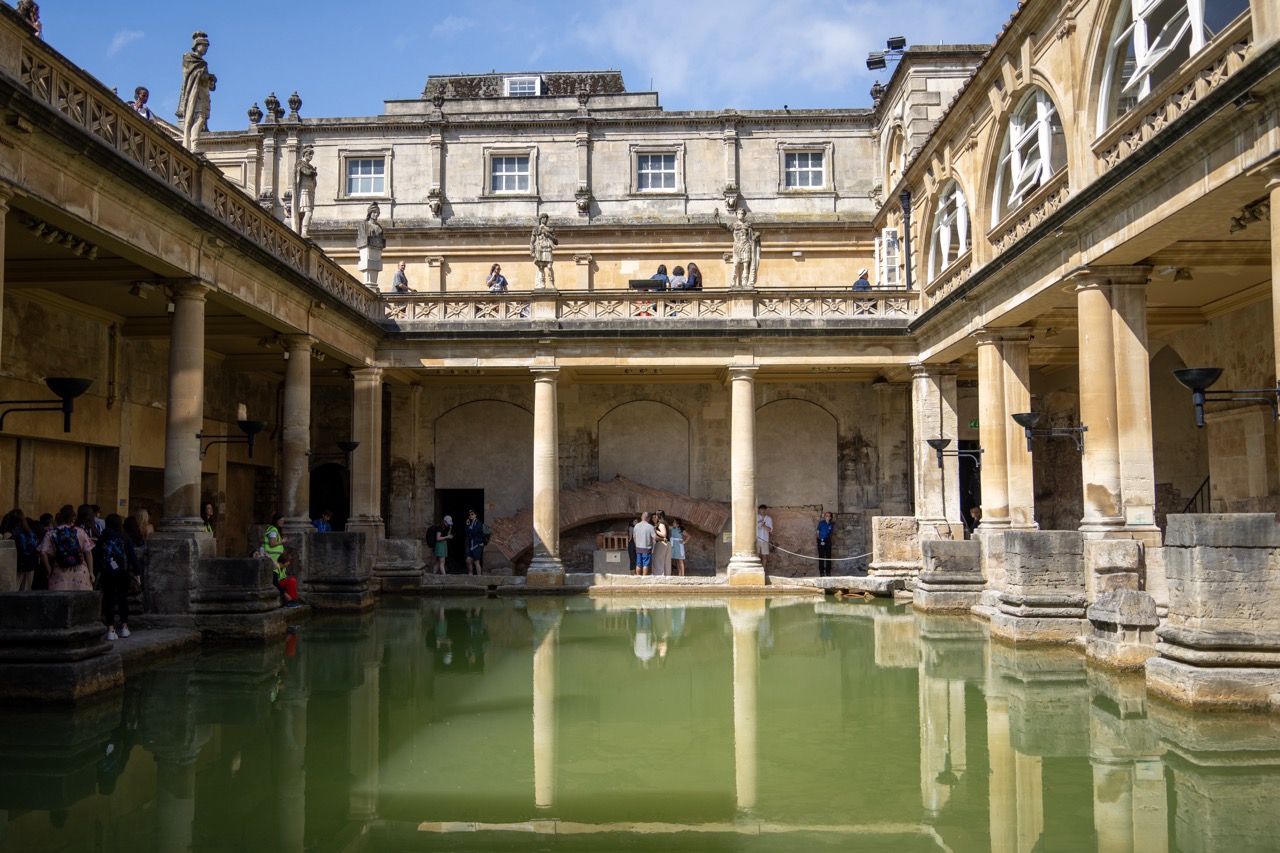

The Great Bath (Slightly Mossy Edition)
Rating: 8/10
This image captures the iconic heart of the Roman Baths in Bath, England, showcasing the large rectangular pool known as the Great Bath, filled with its distinctive green thermal water. A bustling array of tourists mill about on the lower level beside the pool and along the upper colonnaded walkway, taking in the grandeur of the ancient site. The mood is vibrant and historic, tempered slightly by the modern-day crowds. The composition places the luminous green water prominently in the foreground, offering a striking reflection of the surrounding architecture and columns, while the eye is led back to the impressive multi-story building framing the scene. The bright sunlight creates strong highlights on the golden stone and casts deep shadows under the arches and walkways, defining the structural elements and adding depth. Pertinent objects include the substantial stone columns, the arched recesses along the walls, the upper balustrade adorned with statues, and the ever-present flow of visitors. The background consists of the beautifully preserved (or reconstructed) Roman-era buildings under a bright blue sky.
From a photographic standpoint, the classic wide-angle view effectively encompasses the scale of the Great Bath. The lighting, while providing definition, is quite high-contrast due to the midday sun, leading to blown-out highlights on some parts of the building and deep shadows where detail is lost – a common challenge in bright conditions at open sites. The color palette is dominated by the rich green of the water and the warm tones of the limestone, accented by the clear blue sky. The reflections in the water are a key visual element, adding symmetry and interest, though they are slightly distorted by surface ripples. The statues along the upper level add character and a sense of historical context, looking down perhaps in amusement at the modern pilgrims. While the composition is standard for depicting this famous location, a more dynamic angle or attention to foreground detail could have elevated it further. Still, it’s a solid capture that effectively conveys the atmosphere and scale of this remarkable ancient wonder, even if the water looks less like a spa and more like a giant pond where you definitely wouldn't want to lose your keys.


A Dip in Time (or Maybe Just Algae)
7/10
Step right up and gaze upon the illustrious Roman Baths, where history meets a shade of green typically reserved for radioactive waste or particularly aggressive pond scum. In this busy scene, a gaggle of tourists lines the edge of the ancient pool, likely being regaled with tales of Romans soaking their worries away, utterly unaware that their legacy would be immortalized in a photograph featuring water the color of diluted Mountain Dew. Up on the balcony, more folks peer down, probably wondering if they left the kettle on. The mood is a standard mix of historical awe and the low hum of collective fatigue that accompanies most sightseeing trips, punctuated by the vibrant hues of modern Gore-Tex against millennia-old stone. The pertinent objects include the large ancient pool itself, the surrounding stone walkways and walls adorned with columns and niche-like entrances, and the ornate upper balcony level with its decorative elements.
From a photographic perspective, the composition uses the imposing column on the left to frame the scene, though it does feel a tad like it's photobombing the entire shot, perhaps slightly limiting the view but adding depth. The natural light is decent, casting soft shadows, but the real star (or villain, depending on your taste) is the vibrant, almost unnatural green of the water, which dominates the color palette. It creates a stark, slightly surreal contrast with the earthy tones of the stone structure that forms the background. The reflections in the water offer a nice visual element, doubling the crowd below, but again, the intensity of the green makes them look like ghostly figures floating in a swamp. It's a classic documentary-style travel photo capturing the essence of a popular historical site, albeit one where the water looks suspiciously like a VFX error from a low-budget fantasy film. Maybe next time, bring a water filter... or just your camera.
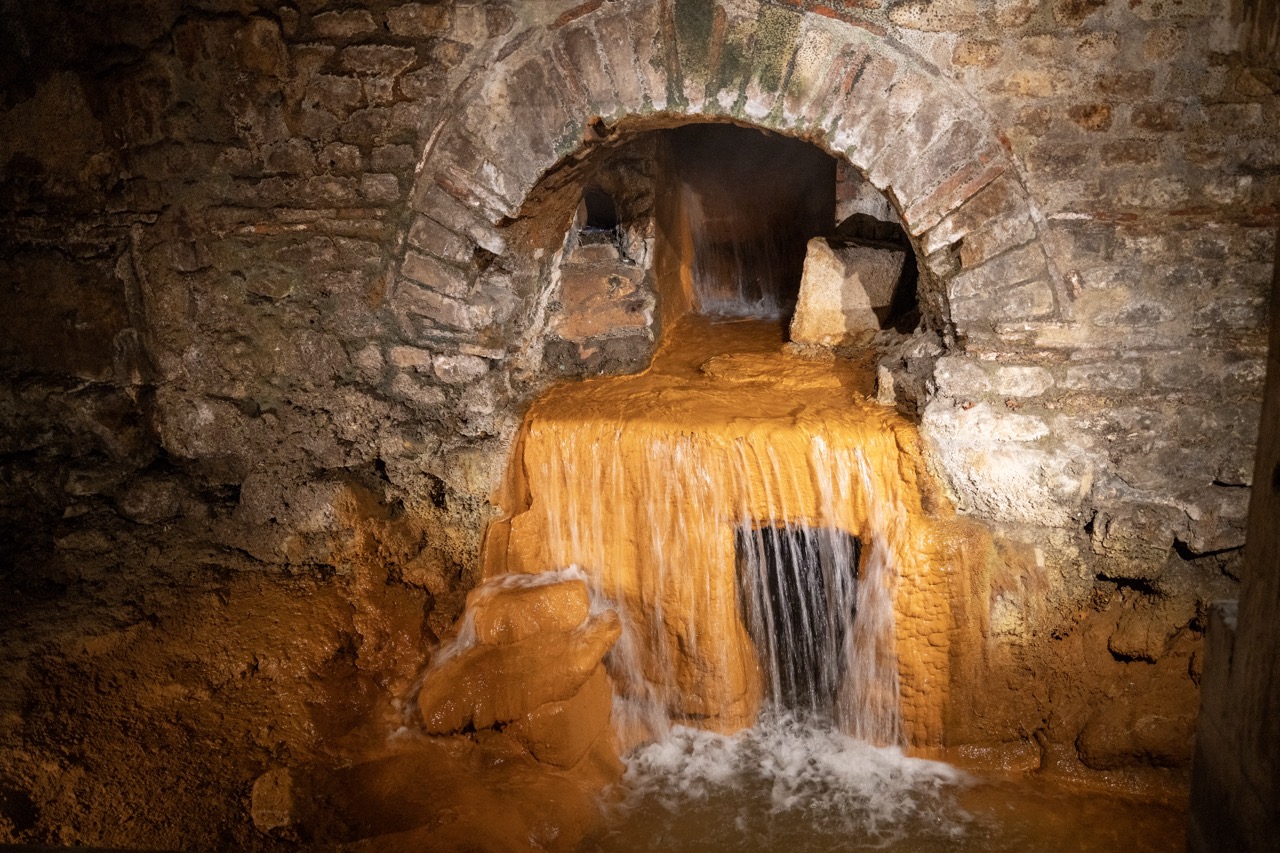

Iron Curtain Falls
Subject Rating: 8/10
This image plunges us into a hidden, ancient space where a waterfall dramatically descends through a weathered stone and brick archway. The subject is fascinating – a vibrant, mineral-rich waterfall that cascades down over stepped, orange-stained rock formations before tumbling into a pool below. It looks less like water and more like liquid rust or perhaps the world's most alarming concentration of iron deficiency. The surrounding walls, a mix of rough-hewn stone and aged brickwork, create a sense of enclosure and history, suggesting this is part of an old structure, perhaps a crypt, a mine, or a forgotten aqueduct. The overall mood is mysterious and somewhat eerie, amplified by the dim, focused lighting.
From a photographic standpoint, the composition expertly utilizes the archway as a natural frame for the waterfall, drawing the eye directly to the main event. The lighting is a key player here, being intentionally dark to enhance the contrast and highlight the movement and unique color of the water. It creates a moody, dramatic effect, though it makes exposing the dark stone walls challenging – they seem a bit underexposed, but perhaps that's intentional to keep the focus tight. The color palette is dominated by the striking orange of the water and rock, set against the muted, earthy tones of the stone and brick. The white balance seems reasonably handled given the dominant orange cast, though it's a tough scene for any camera. The photographer has likely used a slightly slower shutter speed to capture the silky motion of the falling water, a classic technique for waterfalls, which works well here to convey fluidity despite the thick, almost viscous appearance of the water. It's a successful portrayal of a unique and visually arresting subject.
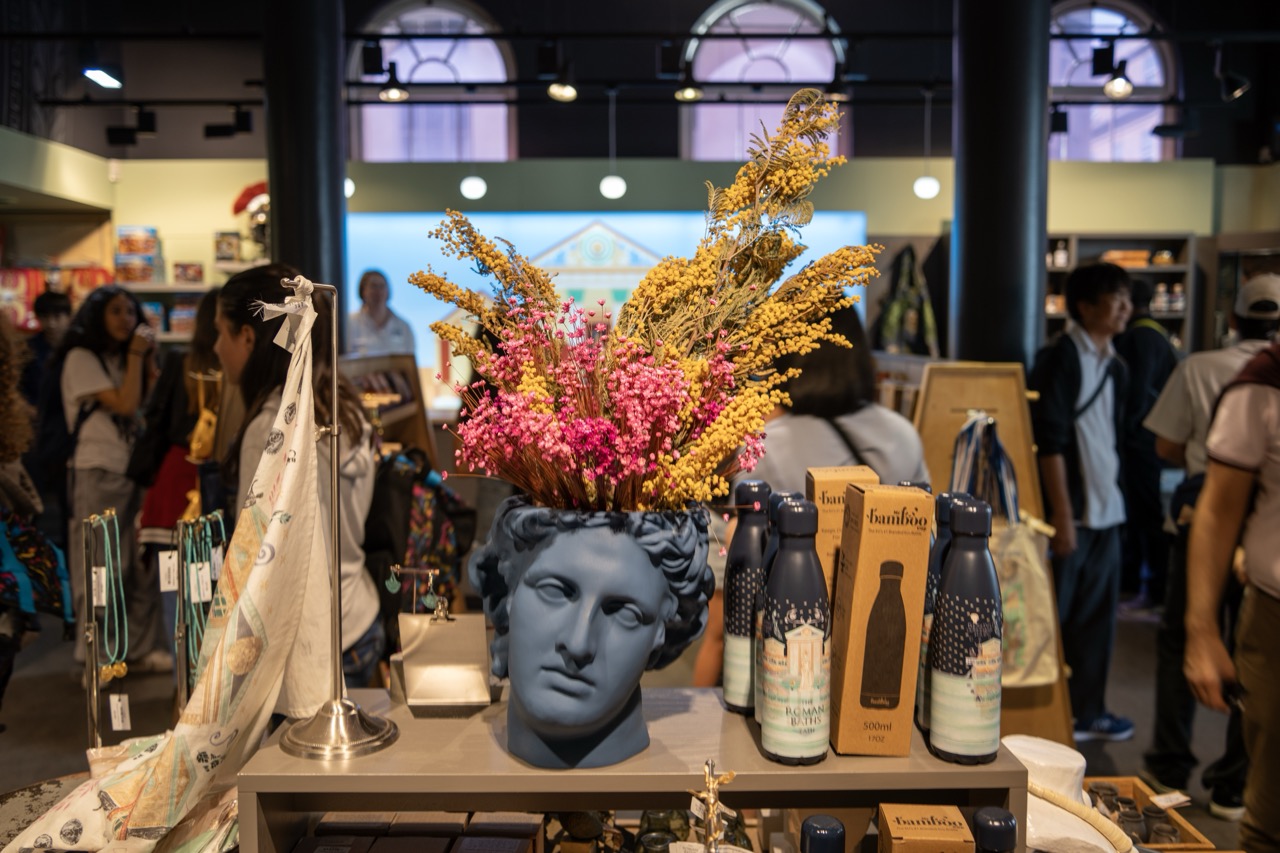

Classical Blooms and Retail Rooms
Subject Rating: 7/10
Okay, what we have here is a shop floor doing its absolute best to bridge the gap between ancient history and modern hydration. Our main subject, rated a solid 7/10 for effort and sheer floral extravagance, is a dramatic arrangement of pink and yellow dried flowers sprouting rather impressively from a classical-style head vase – clearly, even ancient busts appreciate a good accessory. The scene captures the bustling energy of a gift shop, likely attached to a museum or historical site given the merchandise hints. People are visible milling about in the background, perusing shelves packed with various goods, creating that familiar retail buzz. The mood is one of commercial activity overlaid with a touch of historical reference, a place where you can ponder the past while contemplating which water bottle best matches your toga, or lack thereof.
From a photographic perspective, this shot puts the striking floral display front and center, commanding attention with its vibrant colors and slightly absurd charm. The focus is sharp on the foreground display, which includes the head vase, the flowers, and a selection of dark water bottles, some packaged in cardboard boxes that clearly state 'bamboo' and 'Roman Baths' (because who doesn't want a souvenir water bottle from a historic spa?). The depth of field is shallow enough to soften the background, preventing it from completely distracting from the main subject, though the details of the browsing customers are lost in the blur. Lighting seems a bit mixed, providing highlights on the bottles and flowers but leaving some areas a little shadowed. The composition uses the display shelf as a strong horizontal anchor, while the vertical elements of the bottles and the floral arrangement provide visual interest. It's a practical shot for documenting the store's offerings, capturing the 'you are here' feel of browsing amidst history-themed souvenirs.
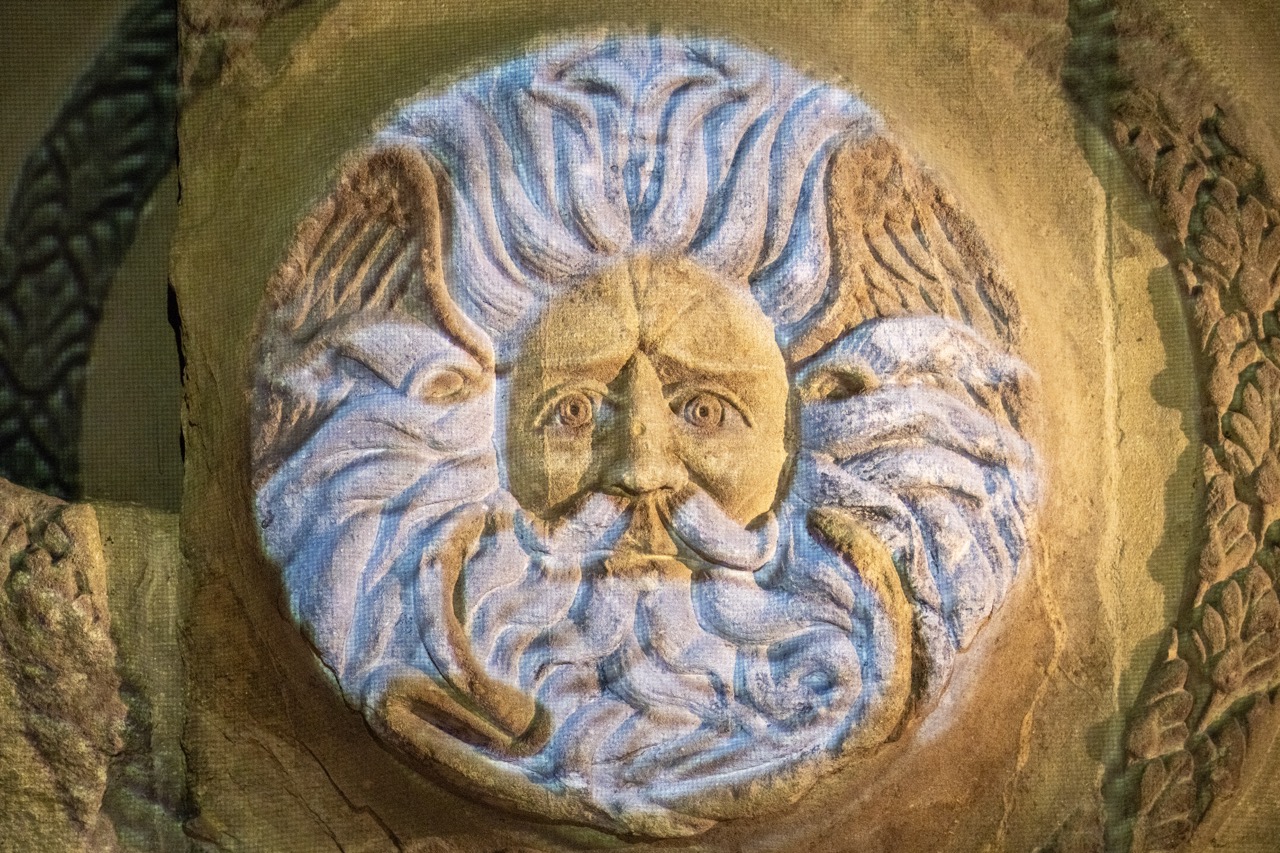

Stone Cold Stare-Down
Subject Rating: 8.5/10
Behold, a face carved into stone, looking rather displeased, perhaps contemplating the eternal discomfort of being perpetually stuck on a wall. This ancient visages features a grand, flowing beard and an equally dramatic head of hair or mane, all neatly contained within a circular medallion frame. The expression is one of weary surprise, with wide, perhaps slightly anxious eyes staring directly ahead, a bushy mustache drooping over a pursed lip. The overall mood is one of ancient gravitas mixed with a touch of existential dread, as one might feel after centuries exposed to the elements. Surrounding the central face are hints of further stone carving, including a textured, perhaps leafy or scaled pattern on the left and a more clearly defined, textured border on the right. The background is the rough stone surface of the structure itself, providing a stable, earthy backdrop to this weathered protagonist.
From a photographer's perspective, this shot absolutely nails the dramatic lighting. The light, seemingly hitting from the upper right, rakes across the textured stone, creating delicious shadows that emphasize the depth of the carving – look at those eye sockets! The high contrast on the facial features makes them pop, though it leaves some of the beard detail a little lost in shadow. The color palette is warm and earthy, with the yellow-brown stone dominating, contrasted by the cooler, almost grey-blue hues highlighting the raised parts of the mane, maybe a trick of the light or just good old-fashioned weathering. Compositionally, the central face is framed effectively, drawing the eye immediately. The slight inclusion of the surrounding architectural detail adds context without distracting from the main subject. It’s a solid capture of a fascinating, albeit slightly miserable-looking, piece of history.


Post-Graduation Glow (and Shades)
Rating: 7.5/10
The air buzzes with accomplishment as a group of graduates, still donning their traditional black gowns and academic hoods with striking yellow and blue lining, gather outdoors post-ceremony. At the heart of the image, a young man sporting a particularly cool pair of round sunglasses glances towards the camera, his look somewhere between confident and "can I take this off yet?". Beside him, a young woman in a vibrant red floral dress lights up the frame with her expression, perhaps sharing a joke or a celebratory moment. Other graduates and attendees fill the background, creating a bustling sense of occasion, all set against the soft blur of classic university architecture and pavement. Relevant objects abound, from the indispensable cell phone clutched in hand to the ever-present mortarboards perched precariously atop heads.
As a slice of graduation day life, this photo captures the candid energy beautifully. The natural lighting is kind, providing a soft, even illumination suitable for portraits, though the sunglasses add a layer of mystery (or tactical sun protection) to several subjects. Compositionally, it feels like a grabbed moment – dynamic and full of life, but perhaps a tad cluttered, a hazard of event photography. The sharp focus on the central pair is effective, drawing the eye, but the bright blue barrier cutting across the bottom feels like an unwelcome guest at the party, distracting from the main event. It's a documentary style capture, full of personality and color contrasts between the formal wear and the celebratory civilian attire, perfectly portraying the mix of tradition and modern style at a university graduation, despite a few visual speed bumps like that rogue blue tape.


Graduation Day Crowd Scene
Subject Rating: 7/10
This image captures a classic post-ceremony moment: the slightly awkward mingling outside the grand hall. The main subjects, a group of individuals foregrounded against a historic building, represent the core of a graduation – the graduate in their cap and gown (with a striking yellow stole, which frankly, steals the show from a purely visual perspective), flanked by what appear to be proud but perhaps slightly weary family members. The scene is bustling, with other attendees and graduates visible in the background, lending a sense of scale and event. The mood is definitely celebratory, tinged with the slightly stilted formality of people trying to look important while also figuring out where to go next. Pertinent objects include the essential graduation attire, smart suits, a patterned dress, a large blue bag that probably contains a change of shoes or emergency snacks, and a strategically held bottle of a refreshing yellow beverage – because hydration is key, even when looking formal.
From a photographic standpoint, the composition places the main group slightly off-center, which works reasonably well, though the cropping on the right feels a touch tight, cutting off a figure abruptly. The depth of field effectively isolates the foreground group from the background crowd and building, focusing attention where it should be. However, the bright, direct sunlight results in rather harsh lighting, creating strong shadows and potentially blown-out highlights on skin tones. This is a common challenge in outdoor event photography under midday sun – great for visibility, less ideal for flattering portraits. The color palette is dominated by the dark academic robes and suits, punctuated by the vibrant yellow of the stole and the patterned blues and greens of the dresses, providing necessary visual interest against the muted tones of the paving stones and building facade. It's a documentary style, capturing a slice of the event, but one might wish for softer light or a more dynamic composition to truly elevate the moment beyond just recording who was there.


Academic Capes of Power
Rating: 7/10
Here we see three newly credentialed individuals looking like they've just stepped out of a superhero convention, except their powers likely involve extensive library research and essay writing. Clad in vibrant academic regalia – flowing maroon and gold capes and jaunty hats – they stride purposefully down a sun-drenched street, looking like they're about to solve a complex global issue, or perhaps just find a good pub. Their expressions, partially obscured by sunglasses (essential gear for confronting the blinding light of post-graduation reality), suggest a mixture of pride, relief, and maybe a touch of "are we supposed to take these off now?" The woman between the two men adds a touch of elegance in her white dress beneath the academic finery. In the background, the bustling street provides a stark contrast to their formal attire, with other people, some also in graduation robes, navigating the sidewalk, while stone walls, greenery, and classic city buildings frame the scene.
From a photographic standpoint, the composition places the main subjects prominently, their colorful gowns dominating the frame and creating a strong visual focal point. The bright, direct sunlight is both a blessing and a curse; it beautifully illuminates the rich colors of the fabric but also creates deep shadows, especially on faces. The slightly lower angle emphasizes the sweep of the gowns and gives the subjects a dynamic, almost larger-than-life presence. The depth of field effectively isolates the graduates from the background activity, keeping the focus squarely on their moment of celebration. It's a candid capture that freezes a fleeting moment of transition, blending the formality of academic achievement with the casual reality of a summer's day in the city.


The Planter's Moment in the Sun
Subject Rating: 8/10 (The planter steals the show with its texture and colour; the humans are charmingly out of focus)
The undisputed star of this photograph is a wonderfully textured stone planter, plump with vibrant purple flowers and spiky green leaves, standing proudly in the foreground. Positioned slightly off-center, it commands attention with pin-sharp detail, while the world behind it dissolves into a dreamy, creamy bokeh. It's a bold photographic choice, turning away from the potential human drama (like a graduation happening in the background, judging by the regalia) to celebrate the humble beauty of urban flora. The weathered stone of the planter, showing age and character, provides a solid anchor against the softer, more ephemeral blooms, proving that even inanimate objects can have serious presence when given the spotlight they deserve.
Behind our floral hero, a slice of life unfolds in a pleasant blur. Figures wearing suits and graduation gowns stroll along, hinting at a momentous occasion, while a stately building with classic architecture provides a grand backdrop under a bright, sunny sky. The light is direct and cheerful, illuminating the scene and making the purple of the flowers truly pop against the muted tones of the stone and the background buildings. While some might argue the focus should be on the people, the composition here playfully subverts expectation, using a shallow depth of field not just to isolate the subject, but to *redefine* the subject. It’s a humorous nod to the fact that sometimes, the most compelling details are found right under your nose, even if they're just pretty flowers in a pot while history walks by.


Graduate Stare Down
Subject Rating: 8.5/10 for successfully navigating bright sunlight without completely shutting her eyes.
This image captures a young graduate, donned in the full academic regalia – a classic black gown, vibrant blue v-neck, and a yellow and blue trim, topped off with the quintessential black mortarboard and tassel – walking outdoors on a sunny day. She appears deep in thought or perhaps just battling the sun's glare, her expression a mix of pensive reflection and mild discomfort. The mood feels like a moment of quiet contemplation amidst the celebratory bustle of graduation day. A significant, moss-covered stone planter with a splash of purple flowers dominates the foreground on the right, adding an unexpected, earthy element to the scene.
From a photographer's perspective, the composition uses the large planter to frame the subject, creating a sense of depth, though it does occupy a substantial portion of the frame. The lighting is the real challenge here – the harsh midday sun creates strong highlights and deep shadows on the subject's face, making it tricky to get an even exposure without blowing out details. While 'dramatic' lighting is sometimes intentional, here it feels like a battle with the elements. The background is a pleasingly blurred street scene, suggesting a lively environment without distracting from the subject, showing other graduates and buildings in soft focus. The choice to capture this candid moment, focusing on the individual's experience within the larger event, gives the photo a personal touch despite the technical hurdles presented by the lighting.


A gloriously sunny day unfolds in this park scene, where the undisputed, albeit slightly stoic, star is a charming hexagonal gazebo. Surrounded by a lush, circular bed of roses and greenery, this structure features a dark green frame and a multi-faceted shingle roof topped with a decorative golden finial. Its railing is playfully adorned with musical notes, hinting at potential performances, though today the only sounds are likely birdsong and the rustle of leaves. The vibrant, almost impossibly green lawn dominates the foreground, inviting leisurely strolls or, in the case of one dedicated individual, serious reading from the comfort of a deck chair, casting a wonderfully dramatic shadow. Further back, a couple shares a moment on a bench along a winding path, nestled amongst trees and shrubs, with glimpses of a distant, grand building peeking through the foliage, grounding the scene in a specific, perhaps historical, location.
Subject Rating: 7/10 - It's a lovely gazebo and a pleasant park, but it's a fairly standard park scene.
From a photographic perspective, the bright, high-noon-ish sun provides punchy colors, making the greens particularly vivid, but also creates challenging contrasts with strong shadows. While the light illuminates the scene well, softer light might have offered a more nuanced look. Compositionally, placing the gazebo slightly off-center works better than a dead-center shot, and the circular rose bed effectively draws the eye inward. However, there's a significant amount of foreground grass; perhaps a lower angle or slightly wider shot could have incorporated more of the surrounding park life or the background elements. The detail on the gazebo railing is a fantastic, unique element that elevates the subject. Overall, it's a well-captured, cheerful image of a peaceful summer's day, perfect for anyone who enjoys green spaces and the subtle promise of music in the air – or just a really comfortable deck chair.
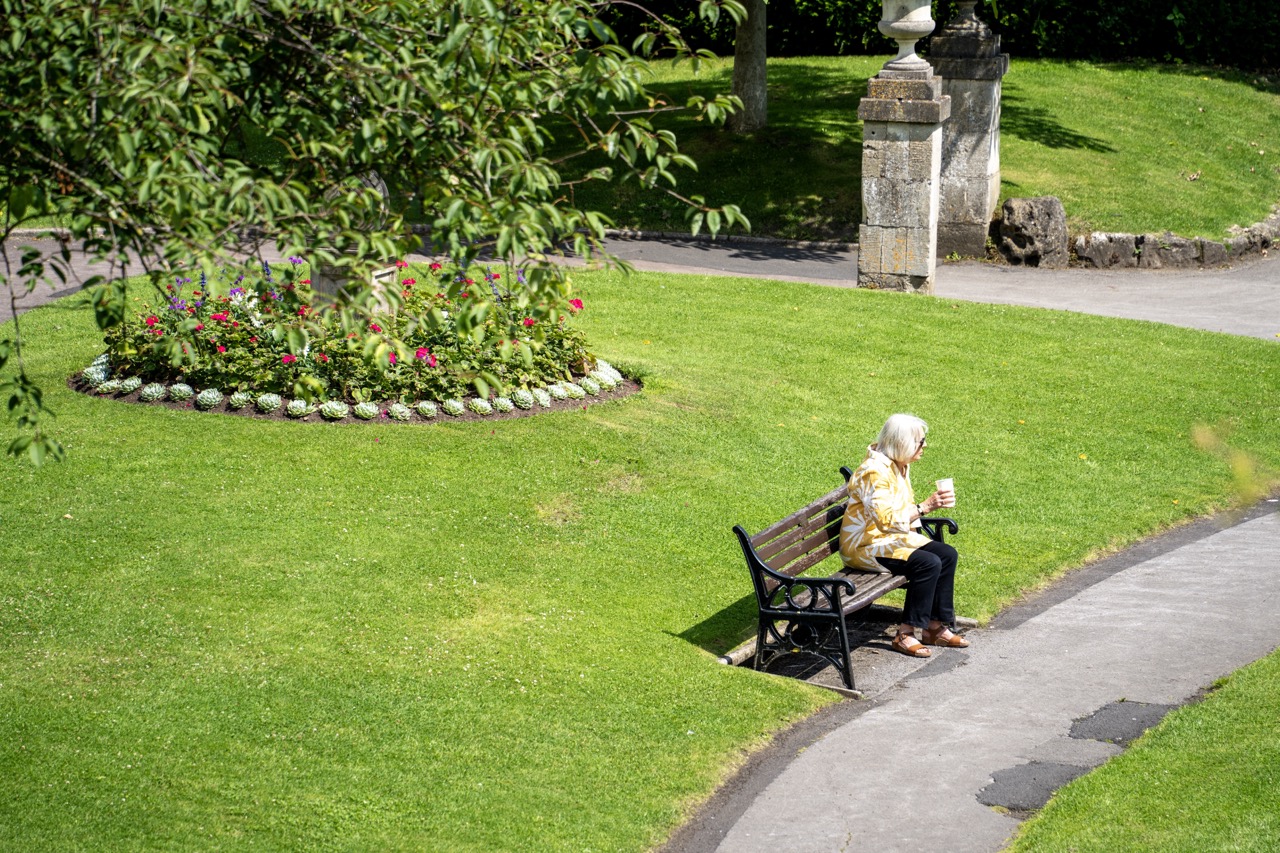

A Quiet Corner in the Park
Subject Rating: 7/10
Basking in the full glory of a sunny day, a lone figure enjoys a peaceful moment on a classic park bench. Our subject, an elegantly silver-haired woman, holds a cup, perhaps a refreshing beverage, as she gazes across the vibrant green expanse. What's happening is simple yet universally appealing: quiet relaxation in a beautiful public space. The mood is undeniably serene and summery, a perfect snapshot of leisure that makes you want to find your own patch of sun and sit awhile. Notice the charming flowerbed nearby, a circle of bright blooms adding a pop of color against the dominant green canvas of the park. It's the kind of scene that whispers "slow down," a gentle reminder that sometimes the best thing to do is simply *be*.
From a photographer's standpoint, this scene presents some classic challenges and successes. The composition utilizes a slightly elevated perspective, looking down onto the subject and the sweeping path, which provides a pleasant diagonal leading the eye. The woman is placed slightly off-center, balanced by the visual weight of the flowerbed on the left. Lighting is typical harsh mid-day sun, creating strong contrast; while it makes the greens pop, it also produces deep shadows under the bench and foliage – watch out for those crushed blacks! The color palette is dominated by the lush emerald of the grass, punctuated by the cheerful reds and purples of the flowerbed and the warm yellow of the subject's shirt. It's a straightforward, almost documentary style shot of a lovely park scene, capturing a moment of quiet contemplation effectively, despite the tricky lighting conditions.
Loading map...